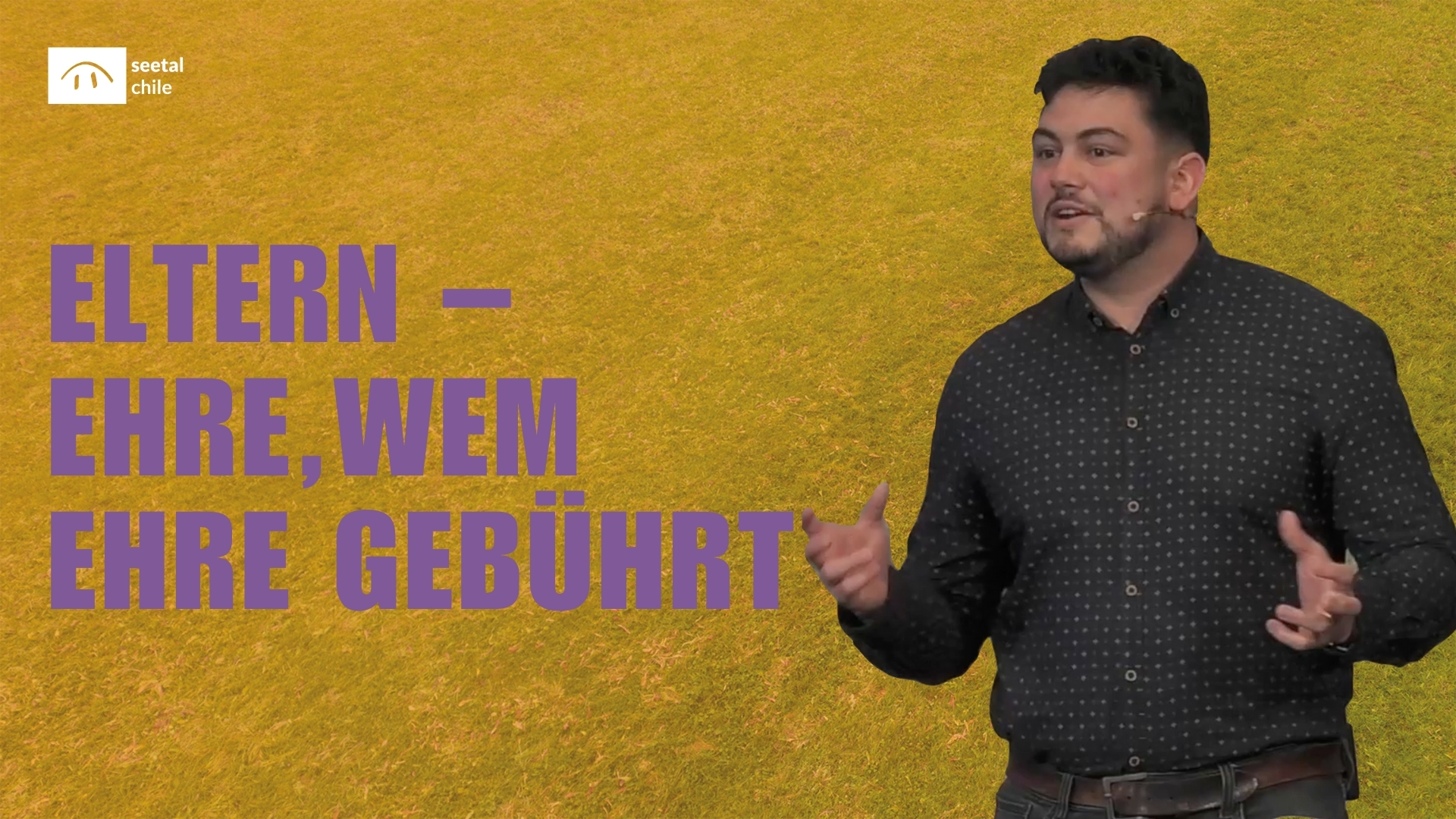From the ballroom to the «pitchfork
Series: Welcome home | Bible text: 1 Corinthians 3:10–15
In the parable of the two prodigal sons, the question arises, who then is to do the work on the farm? Obviously, the older brother made a mistake by toiling in the fields like a slave. But just sitting in the banquet hall doesn’t work either. Every human being reaches out for love, acceptance and appreciation. If we try to earn these things by our actions, it comes out badly. But if we act on the foundation of love, acceptance and appreciation, it turns out very well.
Why are Christians often characterised on the basis of their behaviour? The environment not infrequently perceives Christians as people who have to follow rigid rules and are against abortion, active euthanasia and gender ideology. A Barna Research survey sought an answer to the following questions: «Rigid rules and strict guidelines play an important role in my life as a Christian and in our church.» Extra unsympathetic words like «rigid» and «strict» were used. Nevertheless, 66% agreed with the statement. Why are Christians described on the basis of their behaviour and not on the basis of their home in the house of God? My thesis is that we have strong similarities with the older brother in the parable (Luke 15:11ff). He too defined himself by his behaviour.
This week someone said that he was experiencing a bias towards performance in seetal chile. This has to do with its protagonists. This observation hits the nail on the head, because one of my life mottoes is: «Nothing comes from nothing.«Is that disreputable or even wrong? It can be, but it doesn’t have to be, as we will see in a moment.
The behaviour of a slave
We tend to behave like the elder brother. Literally, the latter says to his father: «You know: All these years I have slaved for you like a slave, I have never disobeyed you. What have I got in return?»(Luke 15:29a GN). Slaved like a slave, been obedient – to get something in return! The good man wanted to earn his father’s blessing by doing the right thing. He did not understand that the Father’s love and acceptance depend neither on his good nor on his brother’s bad behaviour. Perhaps he thought that he simply had to make this sacrifice now in order to benefit from the inheritance later. Subconsciously, we may sometimes think that we have to make a sacrifice for Jesus in this world in order to have a good life later in eternity. We put ourselves off until later and «grind» our way through life instead of enjoying life in the Father’s house now.
Every human being is in search of love, acceptance, appreciation and forgiveness. The older son did this by bustling about. This search also has other faces: we feel uncomfortable in a group, inferior as outsiders. To get the attention we seek, we do a lot. We slip into a role or try to show off our successes and achievements. Other people still seek the recognition of their biological father, even though he has long since died. Throughout childhood, they did not experience unconditional love and acceptance. They were always told: «Yes, but…» Meanwhile, they have arrived at the doctorate, but remain in pursuit of this unconditional acceptance.
Steve writes: «For many years I lived exactly like the older brother. I became a Christian as a teenager and one thing I didn’t realise at the time was that if I had sinned, I could have returned to God immediately, into His presence, where everything would have been good again. But I thought I had to earn God’s approval anew first. If I had messed something up, I didn’t dare go near Him. He was this Holy Being for me – which is true – but I felt like a little worm that had no business being in His presence. When I did dare, I felt like an unworthy Christian until I had three really good «quiet times» in a row. But God does not want us to be like that.»
Someone said: «Now this woman was a faithful follower of Jesus all her life and a great example for many. Why does she now become deathly ill at such a young age? She did not deserve that!»
What was it like on the farm in the parable of the father and the two sons? There was a lot of work to be done! Where would they have got to if life had been exhausted on the festival hall? Nothing comes from nothing. Financial ruin and chaos would have been the result.
The behaviour of a son
The younger brother came back from his booze cruise and was asked straight into the ballroom. Not quite. In between, he was presented with three items that confirmed his full acceptance as a son. Through these gifts and the gesture of welcome, the Father demonstrated acceptance, appreciation, love and forgiveness to His Son.
On this strong foundation, the younger brother most certainly slipped into his work clothes and took up the pitchfork. From the ballroom to work. Grace is antithetical to performance, but not antithetical to effort. Both brothers knew how to handle the pitchfork and also used it. Seen from the terrace of the farmhouse, one saw two brothers with pitchforks. Purely visually, no difference could be observed, and yet they were diametrically different.
Paul gives us an interesting hint. He tells us that we can build with different materials: «Whoever now builds on this foundation can use gold, silver, precious stones, wood, hay or straw for it»(1 Corinthians 3:12). The younger brother built with gold, silver or precious stones, the older with wood, hay or straw. Both look good. The differences in building materials will only become visible in the final reckoning of life: «If it withstands the fire, he who built it will receive reward. But if his work burns, he will suffer a painful loss. He himself will be saved, but only as one who escapes a fire with difficulty and hardship.» (14+15).
What is decisive is the foundation of the building, Paul says: «For no one can lay a foundation other than the one that is already laid – Jesus Christ» (11). Building on this foundation means acting out of the love, acceptance and forgiveness we have received. Paul again: «Whatever we do, we do because the love of Christ moves us»(2 Corinthians 5:14a). God wants nothing but love to motivate us. Moved by the love of Christ, we build with gold, silver or precious stones. From a deficit of appreciation and acceptance, we build with wood, hay or straw. Work on the foundation of love, acceptance and forgiveness is not stressful and does not cause burnout, but brings joy. That is why Jesus says: «If you love me, you will keep my commandments»(John 14:15). First the love, then the house rules. Wouldn’t it be wonderful if Christians were identified with love for the Father and not according to the rules of the house?
In each of Paul’s letters, he explains long and broadly to the churches concerned about their identity in Christ as well as about love, acceptance, appreciation and forgiveness. In the letter to the Ephesians, he needs a whole three chapters for this. After this has hopefully been understood by even the most backward and last, he dares to show in two chapters the right behaviour that follows from this. From ballroom to pitchfork and back.
The path to filiation
In all of us there are parts of the younger and the older brother. The longer we are in the faith, the more we tend to lean towards the elder. The big question is: Is there a cure?
I read about a man who was in a psychiatric hospital because of a paranoid personality disorder. He got well by taking steps towards freedom in Christ because of the story of the two prodigal sons. He says something important: «For me, God was always the guy with the stick in his hand. But now I know that he loves me. I don’t want to sin any more, because by doing so I hurt someone who loves me so much.»
This path to freedom is in most cases a longer process. It starts with looking at our imprints, burdens, injuries and fixations, which – if we do not reflect on these things – are automatically the foundation of our actions. We can only build on this foundation with wood, hay or straw.
This foundation must be sharpened away through prayer and pastoral support, as if with a jackhammer. The new foundation consists of the new identity we receive through faith in Jesus Christ. In it is contained all the love, acceptance and forgiveness of the most important person in the universe. To his elder son the Father said: « «Child», the father said to him, «you are always with me, and everything that is mine is also yours».»(Luke 15:31 NGÜ). I believe that this sentence has the potential to turn our lives around. Can we ever grasp this truth?
As a teenager and young person (and still today!), I knew very well the feeling of feeling inferior and not belonging in a group. I envied the entertainers who always knew how to put themselves in the centre. Today, I try to feel satisfied and positive, no matter what position I currently hold in a group. That has to be fought for. As soon as the inferiority comes forward, I have to tell myself sentences like: «Child, you are always with me, and everything that is mine is yours.» This is how I then try to grasp the love, acceptance and appreciation of the Heavenly Father with my heart.
When I come into the office on Monday after an intense weekend, the next sermon or other challenge is already waiting. Sunday after Sunday, you have to confirm yourself as a pastor in front of many people. This pressure sometimes feels quite big. In such moments, I first need to wallow in God’s love and acceptance through prayer. God’s love for me is completely independent of my performance.
It is very important that we learn to speak the truth into our lives in such situations. Jesus says: «You will know the truth and the truth will set you free»(John 8:32).
Apart from these selective exercises in critical situations, it is good to spend a lot of time with the father in order to really breathe in his beneficial manner and house culture. The Gospel is good news for all of us. It leads to freedom. Sure, there are house rules. But they do not define us. It is our family membership with God that defines us. After all, we don’t talk about family A, who hand in their mobile phones at 8 p.m., family B, who tidy their shoes and do a lot of chores, or family C, where children have to hand in household money. It would be just as nice if we Christians were identified not by the rules of the house, but by our membership in the family of God.
When God created human beings, the first thing he did was to give them a Sabbath. Afterwards, the earth had to be preserved and cultivated. The work should be done out of rest and communion with God. The younger son was first allowed to receive the three gifts of sonship and enjoy a party in the banquet hall before taking up the pitchfork. Our lives should also be determined by the basic rhythm of banquet hall – work and back. We must never derive our value from slavish toil. You are invited to step into the banqueting hall of God again and again and rejoice in the childship of God! From this basic position we may operate the pitchfork.
Possible questions for the small groups
Read the Bible text: 1 Corinthians 3:10–15
- How would you characterise Christians in general? To what extent does this also apply to you?
- What was the older son’s problem?
- What exactly is the reason for whether someone builds with gold, silver or precious stones or with combustible materials?
- How can you experience the three gifts of filiation and the banquet hall?
- How can the elder son in us be healed? What is the goal of healing?






